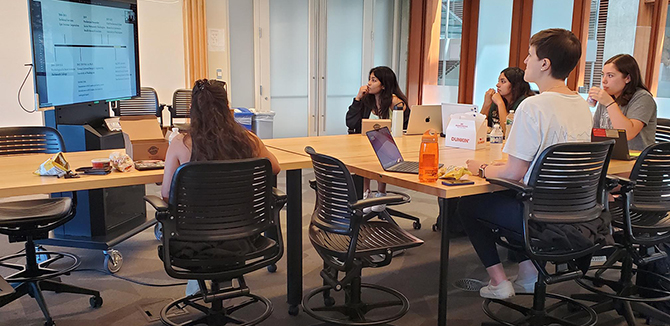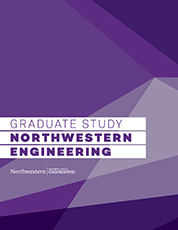Bringing Healthcare Interns Together
Two EDI students reflect on their experience creating Summer Studio, a place for student designers working in the healthcare industry to find connection and community.

Amanda Acquaire (EDI '24) and Ritika Ramesh (EDI '24) thought their summers would be spent focused on their respective internships at Northwestern Medicine.
What they didn't know was that they'd create a makeshift design studio at the same time.
Acquaire and Ramesh applied the lessons they learned in Northwestern's Master of Science in Engineering Design Innovation (EDI) program to create a collaborative team among the EDI students who interned as the only designers in their lab setting.
Knowing they were not the only EDI students in that position, Acquaire and Ramesh used human-centered design as a framework to identify pain points which they used to create Summer Studio, a place where EDI interns in healthcare companies could come together to provide each other support and foster collaboration. The studio launched this summer.
"We wanted to figure out a way to provide support, connection, and mentorship for students who would otherwise be disconnected from design resources while interning in healthcare spaces,” Acquaire said. “We wanted a place that could provide a sense of community where we could learn and share our experiences.”
The duo set up the structure and planned the programming for the Summer Studio sessions with the help of EDI director Amy O’Keefe. The group met weekly in person on campus at the Ford Engineering Design Center.
Programming consisted of a time to share their internship experiences, followed by a lunch-and-learn session featuring guest speakers from the healthcare industry, including:
- Andrew Berry, assistant professor in the Department of Medical Social Sciences at Northwestern's Feinberg School of Medicine.
- Jodi Simon, health service researcher with 20 years of experience in the healthcare field, who currently works as a research scientist at AllianceChicago.
- Chris McCarthy, former vice president of strategy and design at HopeLabs and founder of Innovation Leader Network.
Acquaire and Ramesh said having industry-connected speakers was an extremely valuable part of Summer Studio and added to the overall sense of community it created.
“We wanted to incorporate guest speakers who could share their perspective with our group and provide networking opportunities,” Ramesh said. “We are grateful to have built a network of friends and a community who we feel share our experience and will be a continued resource for us in our professional journey.”
Both Acquaire and Ramesh interned this summer with different research labs at Northwestern Medicine. Ramesh worked as a service design intern with Dr. Ruchi Gupta and the Center for Food Allergy and Asthma Research (CFAAR), helping develop educational programs and a toolkit for colleges across the country to prepare and support college students with food allergies.
Acquaire served as an intervention design intern with Northwestern Medicine, working with Dr. Salva Balbale and the Center for Health Services and Outcomes Research to delve into patient and provider needs to develop a chronic opioid use assessment tool for adolescent and young adult patients with inflammatory bowel disease.
Having Summer Studio as a place to gather with their peers allowed them to build community among designers and across their labs.
“It can be lonely to be the sole designer in a healthcare space,” Acquaire said. “Design hasn’t traditionally been a part of the healthcare field, and trying to find where we fit is an ongoing, important challenge to navigate.”
Acquaire and Ramesh’s hope is that Summer Studio outlives their own time in EDI. The two are collecting their reflections on how things went this summer, the challenges they overcame, and the lessons they learned with the hope to pass the baton forward.
“Running the studio was both challenging and empowering,” Ramesh said. “It’s gratifying to know that the work Amanda and I put in so far and have yet to put in will serve not only our peers but future cohorts as well.”

